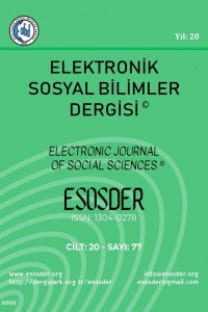THE NEW INSIGHTS ON THE RELATIONSHIP BETWEEN DEMOCRACY AND INCOME: EMPIRICAL EVIDENCE FROM ADVANCED ECONOMIES
Demokrasi, Gelir, Fark-GMM, Sistem-GMM, Doğrusal-Olmayan Spesifikasyon
THE NEW INSIGHTS ON THE RELATIONSHIP BETWEEN DEMOCRACY AND INCOME: EMPIRICAL EVIDENCE FROM ADVANCED ECONOMIES
Democracy, Income, Difference-GMM, System-GMM, Non-Linear Specification,
___
- Acemoglu, D., Johnson, S., Robinson, J. A. & Yared, P., 2008. Income and Democracy. American Economic Review, 98(3), pp. 808-842.
- Andersen, T. G. & Sørensen, B. E., 1996. GMM Estimation of a Stochastic Volatility Model: A Monte Carlo Study. Journal of Business and Economic Statistics, 14(3), pp. 328-352.
- Anderson, T. W. & Hsiao, C., 1982. Formulation and Estimation of Dynamic Models Using Panel Data. Journal of Econometrics, 18(1), pp. 47-82.
- Arellano, M. & Bond, S. R., 1991. Some Tests of Specification for Panel Data: Monte Carlo Evidence and an Application to Employment Equations. Review of Economic Studies, 58(2), pp. 277-297.
- Arellano, M. & Bover, O., 1995. Another Look at the Instrumental Variable Estimation of Error-Components Models. Journal of Econometrics, 68(1), pp. 29-51.
- Barro, R. J., 1997. Determinants of Economic Growth: A Cross-Country Empirical Study. Cambridge, MA: MIT Press.
- Barro, R. J., 1999. Determinants of Democracy. Journal of Political Economy, 107(6), pp. 158-183.
- Benhabib, J., Corvalan, A. & Spiegel, M. M., 2011. Reestablishing the Income-Democracy Nexus. National Bureau of Economic Research, NBER Working Papers 16832.
- Blundell, R. & Bond, S., 1998. Initial Conditions and Moment Restrictions in Dynamic Panel Data Models. Journal of Econometrics, 87(1), pp. 115-143.
- Boix, C., 2011. Democracy, Development, and the International System. American Political Science Review, 105(4), pp. 809-829.
- Bollen, K. A., 1990. Political Democracy: Conceptual and Measurement Traps. Studies in Comparative International Development, 25(1), pp. 7-24.
- Bollen, K. A., 2001. Cross-National Indicators of Liberal Democracy, 1950-1990. Inter-University Consortium for Political and Social Research, 2nd ICPSR version, Chapel Hill, NC: University of North Carolina.
- Bond, S. R., 2002. Dynamic Panel Data Models: A Guide to Micro Data Methods and Practice. Portuguese Economic Journal, 1(2), pp. 141-162.
- Bowsher, C. G., 2002. On Testing Overidentifying Restrictions in Dynamic Panel Data Models. Economics Letters, 77(2), pp. 211-220.
- Capoccia, G., 2016. Critical Junctures. In The Oxford Handbook of Historical Institutionalism, Orfeo Fioretos, Tulia G. Falleti & Adam Sheingate (Eds.).
- Che, Y., Lu, Y., Tao, Z. & Wang, P., 2013. The Impact of Income on Democracy Revisited. Journal of Comparative Economics, 41(1), pp. 159-169.
- Corvalan, A., 2010. On the Effect of Income on Democracy During the Postwar Period. New York University Working Paper.
- Greene, W. H., 2003. Econometric Analysis. 5th edition, Upper Saddle River, New Jersey: Prentice Hall.
- Gundlach, E. & Paldam, M., 2009. A Farewell to Critical Junctures: Sorting Out Long-Run Causality of Income and Democracy. European Journal of Political Economy, 25(3), pp. 340-354.
- Hansen, L. P., 1982. Large Sample Properties of Generalized Method of Moments Estimators. Econometrica, 50(4), pp. 1029-1054.
- Heid, B., Langer, J. & Larch, M., 2012. Income and Democracy: Evidence from System GMM Estimates. Economic Letters, 116(2), pp. 166-169.
- Heston, A., Summers, R. & Aten, B., 2002. Penn World Tables 6.1. Philadelphia: Center for International Comparisons at the University of Pennsylvania.
- Lipset, S. M., 1959. Some Social Requisites of Democracy: Economic Development and Political Legitimacy. Journal of Law, Economics, and Organization, 15(1), pp. 222-279.
- Moral-Benito, E & Bartolucci, C., 2012. Income and Democracy: Revisiting the Evidence. Economics Letters, 117(3), pp. 844-847.
- Papaioannou, E. & Siourounis, G., 2008. Economic and Social Factors Driving the Third Wave of Democratization. Journal of Comparative Economics, 36(3), pp. 365-387.
- Roodman, D., 2009a. A Note on the Theme of Too Many Instruments. Oxford Bulletin of Economics and Statistics, 71(1), pp. 135-158.
- Roodman, D., 2009b. How to do xtabond2: An Introduction to Difference and System GMM in Stata. Stata Journal, 9(1), pp. 86-136.
- Stock, J. H & Wright, J. H., 2000. GMM with Weak Identification. Econometrica, 68(5), pp. 1055-1096.
- Stock, J. H., Wright, J. H., Yogo, M., 2002. A Survey of Weak Instruments and Weak Identification in Generalized Method of Moments. Journal of Business and Economic Statistics, 20(4), pp. 518-529.
- Wooldridge, J. M., 2002. Econometric Analysis of Cross Section and Panel Data. Cambridge, MA: MIT Press.
- ISSN: 1304-0278
- Yayın Aralığı: Yılda 4 Sayı
- Başlangıç: 2002
- Yayıncı: Cahit AYDEMİR
BİLGİSAYAR OYUNLARI TUTUM ÖLÇEĞİ: EBEVEYN FORMU’NUN PSİKOMETRİK ÖZELLİKLERİ
Ferahim YEŞİLYURT, Nur DEMİRBAŞ ÇELİK
BANKACILIK REKLAMLARININ NİTEL VİDEO ANALİZİ İLE İNCELENMESİ: NVivo 10 ÖRNEĞİ
Kasım Can IŞIK, Yalçın KARAGÖZ
KÜLTÜR VE KÜLTÜREL FARKLILIKLAR ÜZERİNE YAPILAN LİSANSÜSTÜ TEZLERE YÖNELİK BİBLİYOMETRİK BİR ANALİZ
Halime GÖKTAŞ KULUALP, Merve YILDIRIM KALEM
İSLÂM HUKUKUNDA ŞEHİTLİK BAĞLAMINDA ŞEHİT AİLELERİNİN MANEVÎ TEMELLİ SOSYAL KORUMASI
ÖĞRETMENLERİN MESLEKİ BECERİ YETERLİKLERİ ÖLÇEĞİNİN GEÇERLİK GÜVENİRLİK ÇALIŞMASI
THE ROLE OF NATIONALITY IN THE GENESIS OF MODERN TURKEY
